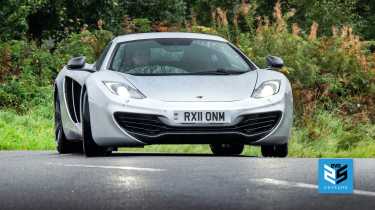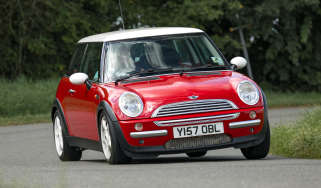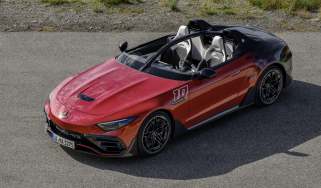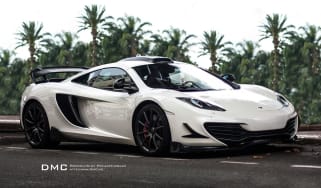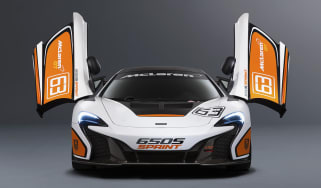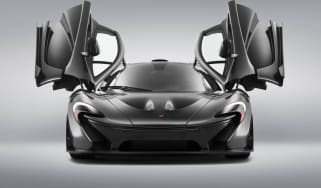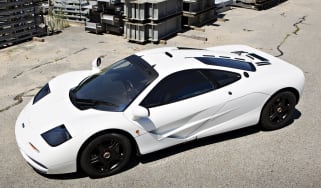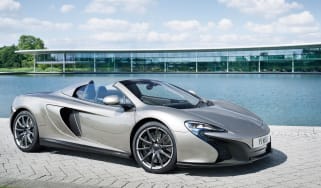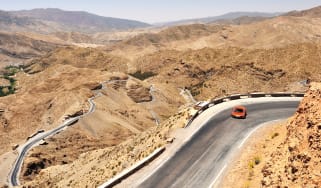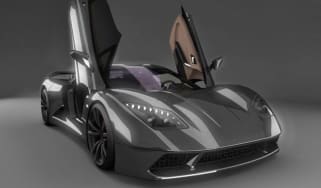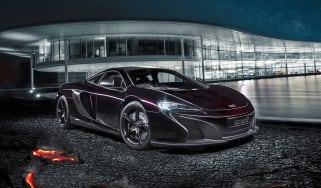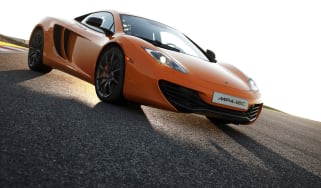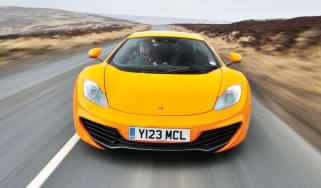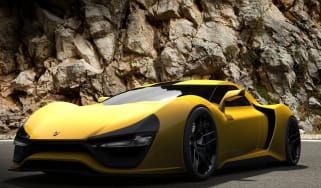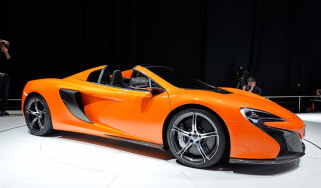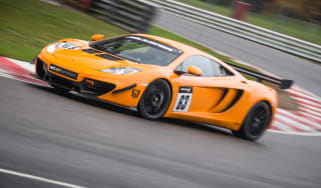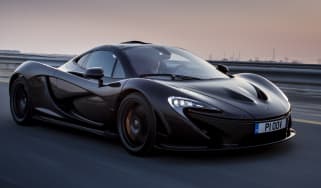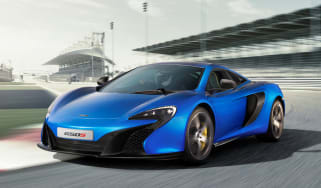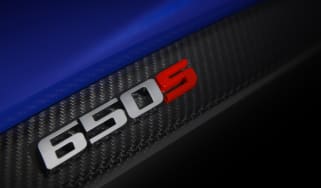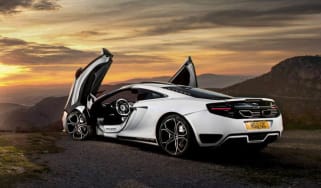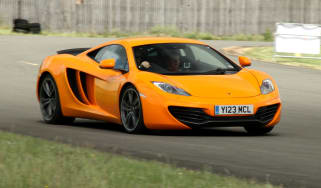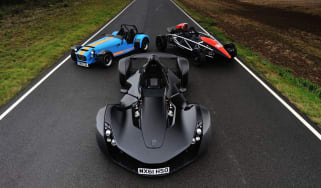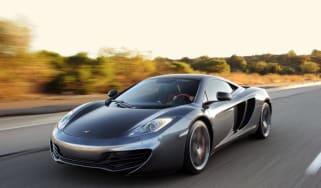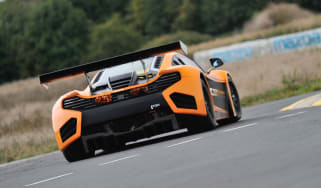McLaren MP4-12C (2011 - 2014): review, specs and buying guide
Not perfect, but stunningly capable and really, really fast; the MP4-12C didn’t connect emotionally, but moved the game on like few others, making it one of our top 25 cars of the last 25 years
‘Game-changer.’ Aside from being a cliché beloved of car writers, the dictionary defines it as ‘an event, idea or procedure that effects a significant shift in the current way of doing or thinking about something’. Which makes the McLaren MP4‑12C a car more worthy of the term than most.
The 12C heralded a new breed of supercar; it took new design approaches and advanced the use of composites in road car manufacture; it formed a direct rival to Maranello’s finest; and it launched a new player onto the supercar stage, albeit one with an old name and an enviable origin story.
> McLaren 750S 2024 review – V8 supercar primed to take on Ferrari’s 296 GTB
When McLaren Automotive was founded in 2010 by Ron Dennis it was, in many ways, a start-up. One with a direct link to 20 F1 titles, a previous incarnation as McLaren Cars (formed in the mid-’80s and resulting in arguably the world’s greatest ever supercar, the F1) and a recent collab with Mercedes-Benz on the less remarkable SLR McLaren under its belt – but a start-up nonetheless.
The clean-sheet MP4‑12C was its first model, the foundation stone of a family that would eventually expand into four lines: the Super Series (12C, 650S, 720S and their variants), Sports Series (570S, Artura et al), Ultimate Series (P1, Senna, etc) and GT (the, erm, GT).
The car pictured here is ‘Job One’, the first production-spec MP4‑12C to be built in 2011. (It and Job Two were retained by McLaren; Job Three was the first car delivered to a customer.) Early cars suffered from reliability woes: the touch-sensitive stroke-to-enter door-catch release wouldn’t always grant entry; the touchscreen, portrait-positioned in a slim spar mid-cockpit, used McLaren’s own native IRIS operating system, which was prone to bugs and glitches. But it was innovative, ambitious, part of McLaren Automotive’s push to do something different, fresh, novel, better.
Regular door buttons were added and the software maladies calmed with updates. Harder to cure was an image of being a little aloof, unemotional in character: ‘clinical’ is the phrase often used by detractors. The car captivated some but left others slightly cold at launch, and the reputation stuck.
McLaren took steps to address this. The Ricardo-built 3.8-litre twin-turbo V8’s note was tuned to sound slightly more nuanced, less industrial. The car’s name was shortened to 12C: the original sounded a little too much like a mathematical formula and not enough like an emotional supercar. As with McLaren’s F1 cars, MP4 stood for McLaren Project 4 – Project Four being the name of Ron Dennis’s racing organisation before it merged with McLaren in 1980 – while 12 was a number assigned to the car from McLaren’s own performance index, comparing various metrics against the car’s rivals. You can see how the ‘clinical’ jibes came about… C stood for carbon, with the 12C and subsequent models built around a carbonfibre MonoCell tub. For its 2014 facelift, it was renamed 650S, distancing itself entirely from the original label.
After five years of continuous development, the 12C/650S had evolved into the limited-run 675LT, one of the all-time greats, a savagely fast, immersively involving car it would be difficult to describe as aloof or unengaging. Its successor, the 720S, was just as ambitious, taking even greater strides forward: expressive, sinewy design language with a fighter jet canopy-style cockpit and performance to rival that of the McLaren F1. It was another game-changer.
Reputedly, McLaren’s rapid launch of models and variants stimulated Ferrari to change the way it developed cars and how frequently it updated its own line-up; the rapid release of 488, 488 Pista and F8 Tributo, for example, were considered a response to McLaren’s quick-shift launch business model – although the strategy is thought to have contributed to a steeper-than-average depreciation curve for McLaren Automotive’s products.
Regardless, driving Job One today is a remarkable experience – and one that underlines everything that makes McLaren Automotive’s subsequent cars so wonderful: clean, laser-accurate steering, a supple ride quality that betters that of many luxury cars, and a truly eye-widening, breathtaking, expletive-inducing turn of pace.
The 12C also kicked off modern-era McLaren’s customer GT racing programme, which has made its mark since, winning countless races and becoming a mainstay of the global GT racing scene.
McLaren today is not without its problems. The Artura has suffered delays and the company has been sailing in choppy financial waters, notably requiring it to sell its Norman Foster-designed HQ to raise funds in a leaseback deal in 2021.
Let’s hope that McLaren Automotive remains fighting fit, because it’s made an indelible mark on the development of the supercar species. It has, to use that phrase again, changed the game. And the 12C was one hell of a way to kick off.
Engine
At the heart of the MP4-12C was a bespoke twin-turbo V8 engine that has since gone on to feature in all McLaren road cars. Here, the 3.8-litre unit produced 592bhp, with 80 per cent of its 442lb ft of torque available at just 1900rpm. These sorts of figures may be commonly seen in contemporary super saloons, but in 2011 they were world-beating, and made the Ferrari 458, particularly its torque-lite naturally aspirated engine, feel a little weedy.
Designed with a flat-plane crank, it revved to the stratospheric heights of highly-strung rivals, but thanks to its pair of turbochargers hit with a thick wave of torque that made light work of its lithe 1300kg kerb weight. The power unit wasn’t perfect (aurally it wasn’t that exciting), and being turbocharged it lacked the razor-sharp response that usually defines supercar engines, but in terms of capability the McLaren’s engine set a precedent.
Transmission
Not only did the MP4-12C’s engine set new supercar benchmarks, like its Italian contemporary it also featured a seven-speed dual-clutch gearbox. As with the rest of the car, McLaren’s Formula 1 ties shone through, as the transmission brought with it a selection of aspects that continue to be defining features in all McLaren road cars.
First were the paddles, which were connected on a rocker, giving the driver the option to push or pull the paddle in either direction to change both up and down. The paddle also featured a pre-cog system, which through two stages of movement would allow the driver to inform the gearbox with an extra layer of certainty which gear he or she wanted to select.
Furthermore, the gearbox was able to be tied into the MP4-12C’s complex traction control and brake-steer systems and able to be configured alongside the engine and chassis, softly slipping between gears or punching through them like a pneumatic racing ’box in a GT3 race car depending on where the switch was set.
Suspension, steering and brakes
McLaren’s innovation didn’t end under the engine cover, as it’s possibly the groundbreaking suspension that was the biggest departure from the supercar norm. Here, it was ostensibly a conventional double-wishbone set-up with coil springs. The twist was in the dampers, which were hydraulically interconnected and allowed the car to do away with anti-roll bars altogether by providing three levels of roll control.
Andy Sheriff, McLaren’s head of product at the time, elaborated: ‘It’s a kind of “proactive” suspension. On a car like this it’s never been seen before. It gives complete control over the level of roll on the car. You can dial in what you want from a control on the centre console: little roll, very little roll and, basically, no roll at all. And it works in a dynamic sense as well. Depending on what the car’s doing, it adjusts the roll stiffness in real time. The advantage of this is when you’re going in a straight line and you don’t need any roll control, you basically have the wheels completely decoupled so you have fantastic wheel articulation. It has the suppleness and articulation of a car that doesn’t have any anti-roll bars.’
Not only should this mean the car had the best ride comfort in its class by some stretch, it should also result in a car with grip levels and handling prowess that, according to Sheriff, were ‘just fantastic’.
The suspension was developed and tested using the same simulation program that McLaren uses for its F1 cars. As Sheriff revealed, the benefits were significant: ‘When we had our first full handling prototype, which was built at the beginning of this year, we took it to the test track, had one and a half days of shakedown and setting up the suspension and, out of the box, it exceeded our objectives. So then we set more ambitious objectives. It really worked.’
Body, interior and electronics
The designer behind forming McLaren’s aesthetic from the ground up was Frank Stephenson. A seasoned designer, having penned the new BMW Mini and spent time with the Fiat Group, Stephenson was brought on board to form the aesthetic that would go on to underpin a whole suite of mid-engined super and hypercars.
The MP4-12C was criticised for being a little underwhelming to look at when it was launched, but like the car underneath, it was just the first step in McLaren’s growth as a road car manufacturer. Inside, a minimalist approach was applied, with the driver and passenger sat close together due to the carbonfibre tub and McLaren’s desire to centre the weight in the cabin as much as possible. As a result, the centre console was very narrow, informing McLaren’s use of a bespoke portrait-layout infotainment system called IRIS.
In contrast to Ferrari, which moved all of the usual stalk functions (lights, indicators, wipers etc) to the steering wheel, McLaren took the opposite approach, leaving the steering wheel clear of all controls. To control the different drive modes, McLaren placed two rotary dials at the base of the console, one controlling the powertrain, and the other the chassis. Designed to give drivers near-infinite control over the car’s different components, it was a complex, albeit clear way of adapting the McLaren to whatever situation it was in, whether driving to the shops, or Silverstone. Like many other elements of the MP4-12C, this sounds relatively commonplace now, but was a groundbreaking element at its launch.
What to pay
Prices for early 12Cs have levelled out. ‘People are waking up to the fact that it has investment potential,’ says specialist Alastair Bols. ‘I reckon there are 250-300 coupes in the UK, and around 100 Spiders, so not a huge number. About ten per cent of those are on the market.’ Expect to pay from £60-70k for an early car with a standard spec and high mileage, with lower mileage, carbonfibre extras, IRIS 2, etc bringing asking price up to the £100,000 for the very best examples.
What we said
‘The MP4-12C operates in a different speed zone to virtually every other car out there. The 442lb ft available from 3000 to 7000rpm leaves you slack-jawed at the car’s ability to fashion crazy speedo numbers from the most innocent jabs of right-hand pedal.
‘Within three laps of McLaren’s test track my mind is comprehensively blown. To feel the different levels of roll stiffness in Normal, Sport and Track configurations, to experience the freakish speed the car will carry into slow, technical turns – actually, make that any braking zone that requires some steering angle – is to realise that McLaren has altered the fundamentals of sports car dynamics.
‘We move to flooded Welsh moorland roads. The conditions would tax an Audi RS4, so I just can’t believe the way this car dismisses the mayhem. Its P Zeros slice through deep water and the ride comfort is superb – only an E-class on air suspension and small wheels could match it.
‘What the 12C trades in traction to four-wheel-drive machines, it more than claws back through its resistance to cambers, its vast wheel travel and its spooky indifference to any flavour of bump. This truly is a car built to excel on UK roads, and we should be hugely grateful; you can use so much of that 442lb ft of torque so much of the time.’ (evo 155)
I bought one
‘I have had sports cars as my daily drives for the last 15 years. After an Elise, Noble 3R, several Porsches, Gallardo and Aston V12 Vantage, I was firmly decided to get a Ferrari 458. A trip to the local dealership left me very disappointed with the build quality and I could not see how such a car would cope with daily usage. However, in the corner of the Italian supercar dealer was a McLaren 12C. I only had to sit in it for five minutes to know this was the car I wanted.
‘It took a couple of months to find my ideal spec – subtle colour, sports exhaust, carbonfibre interior and super-lightweight wheels. I settled for a dark blue 12C with less than 6000 miles on the clock. After 14 months of ownership and a further, virtually trouble-free 15,000 miles, including a trip to Le Mans, I have been thoroughly impressed by the 12C’s unique blend of talents. It is as fast as anything road-legal, and yet comfortable and practical enough to be a true daily-use car. I just love the driver-centric cabin. The quality of the materials and the purity of the design make it a very special place to be.
‘Minus points? IRIS 1, which was originally on my car, cannot do two things at once and drove me crazy. Software upgrades don’t help and you have to invest in the IRIS 2 hardware. Servicing and especially the extended warranty are very expensive, even more so than with a Ferrari. And I have found myself having to argue to get things covered.
‘But the reaction to the car is incredible and you can sense the respect for McLarens in the UK. I also think the 12C is a much more timeless design compared with the 650S, and will become a true McLaren icon in years to come. I usually change my cars every two years, but I might well keep this one for much longer!’
